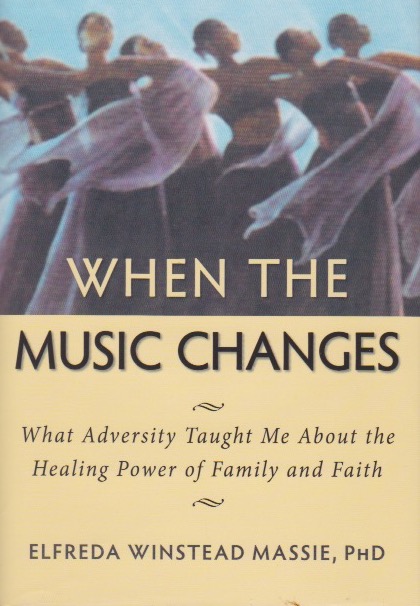 When the Music Changes by Elfreda Massie is not the sort of book I would typically pick up and read. I tend to gravitate toward the heady, rather than the spiritual. And in fact, I would say on most occasions, I outright avoid books with a proclivity toward religious thought as an explanation for, or solution to, the conundrum of life. I’m also not typically one to read memoirs in general; I prefer a direct argument, to a storied lesson. But, Elfreda was a client and I’ve long believed it’s necessary, perhaps essential, to genuinely empathize with my clients if I intend to preserve their likeness authentically, and in fact, honestly feel something about what I’ve created for them.
When the Music Changes by Elfreda Massie is not the sort of book I would typically pick up and read. I tend to gravitate toward the heady, rather than the spiritual. And in fact, I would say on most occasions, I outright avoid books with a proclivity toward religious thought as an explanation for, or solution to, the conundrum of life. I’m also not typically one to read memoirs in general; I prefer a direct argument, to a storied lesson. But, Elfreda was a client and I’ve long believed it’s necessary, perhaps essential, to genuinely empathize with my clients if I intend to preserve their likeness authentically, and in fact, honestly feel something about what I’ve created for them.
So, when Elfreda first reached out and told me she was an author, her book was basically automatically eligible for consideration. When our session came around, I found Elfreda to be warm, kind, strong and authoritative; compelling. The abbreviated stories of her life I was able to hear during my time with her, her perils and victories, made me want to spend more time with her. So by that point, I was eager for the next best thing, so I got to reading the very next morning.
When the Music Changes is fundamentally about the impact faith and family have had on Elfreda’s life through the ups and downs. And there were quite a few ups and downs: From a love story crossing and uncrossing the stars and a litany of medical misfortunes, to losing and winning and losing and winning and losing and winning career positions that, at times, defined her very identity. So much of Elfreda’s feelings as she’s ridden that roller coaster are echoes of our common human condition. No healthy mind has lived without embarrassment, without feeling the sting of getting excited too soon, and without the feeling that there is a place I belong, but this isn’t it. And in that, there’s a connection almost any mindful reader can feel.
In its nooks and crannies, we find lessons about love, acceptance, openness, self-reflection, trust, hope and forgiveness. Elfreda credits much of this to her faith, but stops short of telling the reader that her faith is where they’ll need to learn those things too. As someone who doesn’t define his faith, or codify faith-based beliefs, I obviously appreciated that. But I also generally agree. Some have argued that big-faith beliefs promote a healthy mind by giving it something wholly irrational and indefensible to believe. Something that doesn’t need to be supported with evidence, and whose output is not tangibly “productive”. Elfreda’s appeals to faith fit within this thought process, as most of them come from her experience, rather than some specific scripture reading. You don’t find her explaining how scripture carried her, you find her explaining how believing carried her. She may disagree with this assertion, but it doesn’t come through that way in the book, which I think makes it easier to appreciate if you don’t share her specific outlook on faith.
There was one pervasive theme throughout When the Music Changes which I found gut wrenching, but to which I couldn’t relate, and would never hope to. The realities and disadvantages of growing up as a black person through the 50’s, 60’s and 70’s. The story of Elfreda’s family started in the south, and then moved “up south”. Which is to say, her family sought a more equitable life in the north, but found it only marginally more so. To the surprise, and often denial, of those imbued with a pigment-based advantage, life wasn’t easy for pretty much any black person in the United States, regardless of where they lived. Much of it persisted well into the recent past, and the most easily obfuscated parts continue unseen (by us white people) today.
There is a lot of debate among white people, and a lot of very patient people of all colors, about this concept of “white privilege”. I won’t get too into this here and now because the book leaves the topic mostly untouched. In fact, Elfreda very rarely points fingers at anyone—and never so broadly as to imply the color of one’s skin, or the shapes of one’s features, is any kind of measure of one’s character. But, all the same, as a white man from a firmly middle-class family, it was impossible not to hear these discussions bouncing around in my head. I fancy myself a person sensitive to the institutionalized and ‘culturalized’ inequalities of American life. Yet, even as someone who tries to be mindful, to relate, or to defer to another’s experience, I caught myself casting knee jerk judgements on decisions she and her family made. Judgements I believe I would have made differently. Judgements unwittingly built on the foundation of my experience. Not hers even as she eloquently recounted it, and not the scores of people who have described their plight at the hands of a more privileged group. The very existence of those automatic judgements I observed in myself testify against this delusion of equality. Maybe that’s just me. But, I suspect if someone who actively makes a point to try to defuse and correct their racial biases still sees them crop up now and again, those who make no such effort must be much more encumbered with them. Elfreda is either a liar, or she’s telling the truth and her experience, like everyones brave enough to lay their’s bare for others, should be listened to and used to modify our understanding of our own experience.
When the Music Changes cut, and mended. It helped reveal my own weakness, and helped me be a more mindful person. It helped correct my ego that sometimes still foolishly thinks its own experience is sufficient to judge the experiences of others. It’s not, and I am grateful to Elfreda and many others like her who are willing to write and share and reveal. I have many thoughts about what’s wrong with “people”. But, the reflection that came from this text helped think more along the lines of whats wrong with “me”, and how I can live more in line with my values.
This is a pretty easy read. The chapters are relatively short and end right before you want them to, making it hard to put down. I can definitely recommend this book. No, it’s not for everyone. Some of my friends more egregiously jaded by their time in the church will balk and have difficulty finding the relevant meaning to their lives. But those who can, perhaps should. I definitely left with a net positive for the time I spent and the attention I gave—-and I think I’m among the more jaded of the former-faithful that I know.
You can pick it up a physical copy on Amazon. Or maybe if you send her enough tweets, she’ll release a ebook version so all us spoiled digital-readers can rejoice. But, I enjoyed it enough that even a physical copy did not deter my attention.

Thank you for your review. Writing this book was cathartic for me. I was extremely transparent and realized that I was sharing events and feelings that I had never expressed publicly. I had no preconceptions about what the reader would get from this book but hoped it be a catalyst for others to reflect on their lives to rediscover their inner and external strengths that help them overcome adversity and pain.
I absolutely loved reading it! ❤️